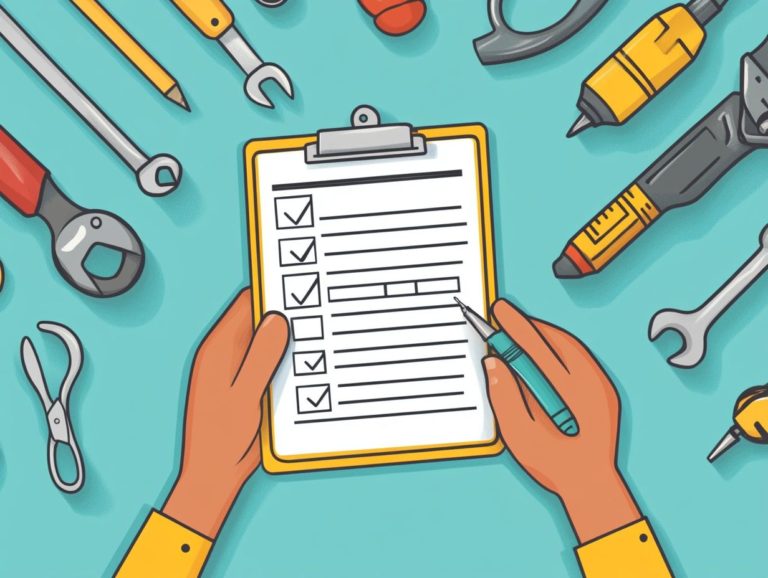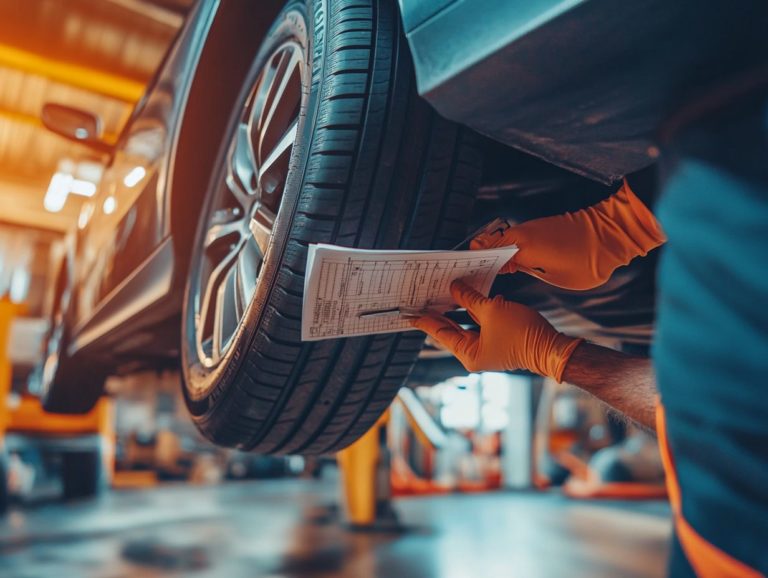Understanding the Cost of a Car Inspection
Car inspections are essential for your vehicle ownership journey. They ensure both safety and optimal performance on the road.
By conducting regular checks, you can find potential issues before they escalate, saving time and money. This article explores the importance of car inspections, factors influencing their cost, and the types available to you.
It outlines average costs and offers practical tips on saving money without compromising quality. Dive in to uncover everything you need to know about car inspections!
Contents
- Car Inspections: A Comprehensive Guide
- Location and Type of Inspection
- Types of Car Inspections
- Average Cost of Car Inspections
- Tips for Saving on Car Inspections
- Essential Car Inspection Information
- What is a car inspection and why is it necessary?
- How much does a car inspection typically cost?
- What factors can affect the cost of a car inspection?
- Are there any additional fees or charges to consider when getting a car inspection?
- Can I negotiate the cost of a car inspection?
- Are there any ways to save money on a car inspection?
Key Takeaways:
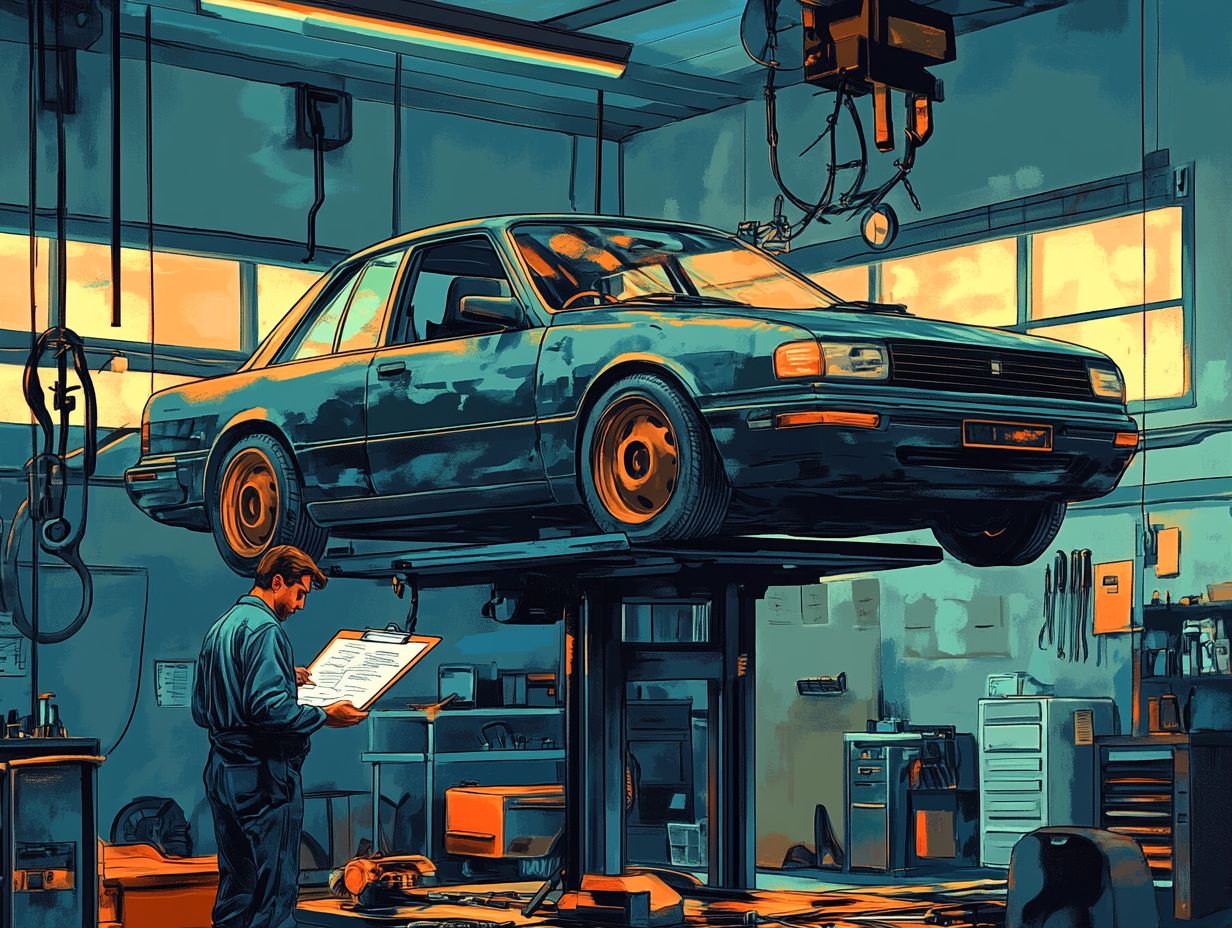
Regular car inspections are crucial for maintaining the safety and functionality of your vehicle.
Factors such as age, condition, location, and type of inspection can greatly impact the cost.
Understanding the different types of car inspections and comparing costs can help you save money in the long run.
Importance of Car Inspections
Car inspections are a key part of responsible vehicle ownership. They ensure that your vehicle meets safety standards and complies with pollution rules.
Regular inspections help you identify potential issues like tire problems, brake wear, and suspension damage, which can affect safety and performance.
Inspections are often mandatory for vehicle registration in many states, such as North Carolina, Texas, and California.
By recognizing the importance of safety evaluations and the inspection process, you can protect yourself from serious defects and avoid high repair costs in the future.
Why Regular Inspections are Necessary
Regular inspections are vital for keeping your vehicle in peak condition, enhancing safety, and ensuring compliance with pollution standards.
If neglected, these evaluations may lead to undetected problems that could compromise performance and put you and your passengers at risk.
Missing timely safety inspections increases the risk of mechanical failures, which can lead to reduced braking efficiency, tire blowouts, and other serious hazards.
It’s essential for vehicle owners to understand that regular check-ups are crucial for safety and reliability on the road.
Factors that Affect the Cost of a Car Inspection
The cost of a car inspection can vary widely based on several factors, including the age and condition of your vehicle, your location, and the specific inspection type needed.
State requirements also play a significant role, as each state has its own regulations that can affect pricing. For instance, in states like California or Texas, you might encounter extra fees for emissions testing.
Understanding these factors helps you budget effectively and make informed choices about your vehicle inspections.
Age and Condition of the Car
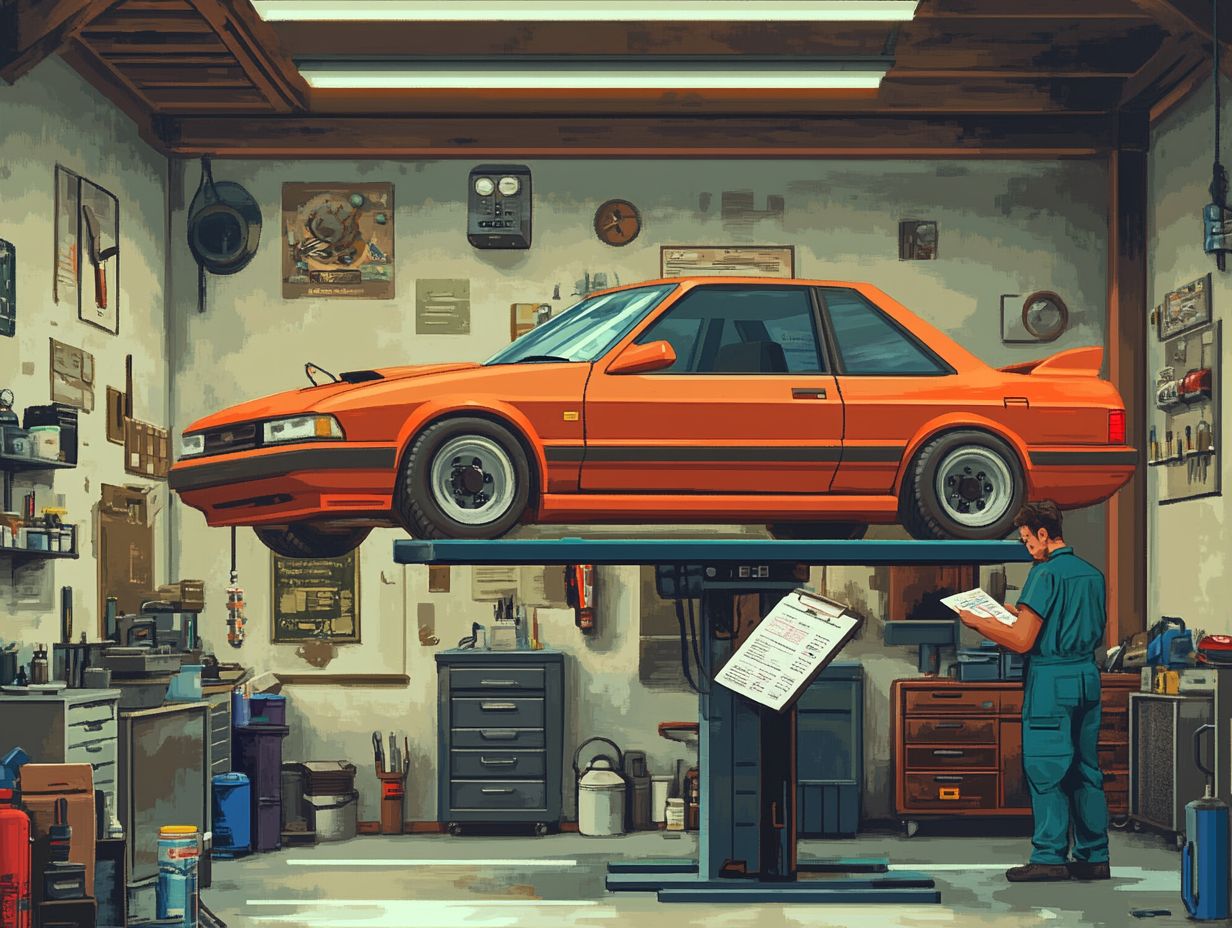
The age and condition of your car are crucial in determining the type and cost of inspections.
For older vehicles, especially those showing signs of rust, worn-out parts, or outdated technology, expect a more comprehensive evaluation.
This is particularly true for used cars that have experienced wear and tear, increasing the chances of hidden issues like brake malfunctions or engine problems.
These complexities lead to more detailed inspections and higher associated costs.
If you are considering a used car, be prepared for the financial implications of checking these potential problem areas, as ensuring safety and reliability often comes at a premium.
Schedule your car inspection today to ensure your vehicle’s safety and performance!
Car Inspections: A Comprehensive Guide
Location and Type of Inspection
Location significantly influences the cost and type of car inspection you ll encounter. Rates vary markedly between different inspection facilities. Urban inspection centers often impose higher fees due to heightened demand and operational expenses. Rural facilities may offer more competitive pricing, making them an appealing option.
Some establishments provide specialized services, such as emissions testing or safety inspections, which can further impact the total cost. Understanding the unique requirements set by the DMV is crucial! Guidelines can shift from state to state, so familiarizing yourself with the specific inspection services mandated in your area ensures compliance and helps you dodge potential fines.
This knowledge not only helps you budget for necessary inspections but also guarantees that your vehicle remains roadworthy and in line with local regulations.
Types of Car Inspections
There are various types of car inspections tailored to meet distinct needs, including safety inspections, emissions testing, and maintenance inspections. Each serves a specific purpose in the realm of vehicle upkeep.
For car owners, grasping these inspection types is crucial, as it empowers them to select the appropriate services based on their vehicle s unique requirements. Safety inspections emphasize critical components such as brakes and tires, ensuring your vehicle is roadworthy.
Emissions testing guarantees adherence to environmental standards, while maintenance inspections tackle routine checks for existing issues that foster long-term health and reliability in your vehicle.
Overview of Different Inspection Services
Different inspection services cater to various facets of vehicle health, covering everything from thorough safety checks to tests for pollution control. These services are essential for ensuring your vehicle meets both regulatory standards and safety requirements, ultimately protecting you and the environment.
If you re looking for a thorough assessment, you might find the following inspections particularly beneficial:
- Brake inspections
- Fluid level checks
- Tire evaluations
Such services are designed to identify potential issues before they develop into serious problems. Certified technicians, trained specifically in these inspection services, employ advanced tools to conduct meticulous evaluations, offering you reliable insights into your vehicle’s performance.
Their expertise not only enhances your safety but also keeps you well-informed about necessary repairs and maintenance, promoting long-term reliability for your vehicle.
Average Cost of Car Inspections

Understanding the average cost of car inspections is essential for effective budgeting and ensuring compliance with state regulations. When purchasing a vehicle, knowing what to expect during a used car inspection is crucial. Keep in mind that fees can fluctuate significantly depending on the type of inspection and your location. This knowledge empowers you to plan accordingly and avoid unexpected expenses.
Cost Breakdown and Comparison
A cost breakdown of car inspections enables you to grasp what to expect and compare prices across various inspection facilities. By shedding light on typical expenses involved, you can make informed decisions tailored to your specific needs and the prevailing market rates in your region. For more detailed insights, consider reading what car buyers need to know about inspections.
For example, inspection fees in urban areas tend to be higher due to increased overhead costs, while rural locations may offer more competitive pricing. Price variations can also depend on the type of inspection required, such as a basic safety inspection versus a more thorough emissions test.
Understanding these nuances empowers you to budget wisely and choose the right facility, so you won t be blindsided by unexpected costs.
Tips for Saving on Car Inspections
Discovering strategies to save on car inspections can markedly lower the total cost of car ownership. It’s essential for budget-conscious vehicle owners like you to explore every available option. Act now to uncover tips that can significantly cut your inspection costs!
Ways to Lower the Cost of Inspections
There are several effective strategies to reduce inspection costs. Prioritizing regular maintenance and opting for certified pre-owned vehicles can make a significant difference.
Investing time and resources in proactive maintenance can lower the chances of unexpected issues that could lead to costly inspections. Routine oil changes, tire rotations, and brake checks not only improve your vehicle s performance but also extend its lifespan.
Choosing certified pre-owned vehicles is often a wise financial choice. These vehicles usually come with a comprehensive inspection history, giving you peace of mind and potentially saving you from hefty repair bills in the future.
This thoughtful blend of diligent maintenance and smart vehicle selection forms a well-rounded strategy for minimizing inspection expenses.
Essential Car Inspection Information
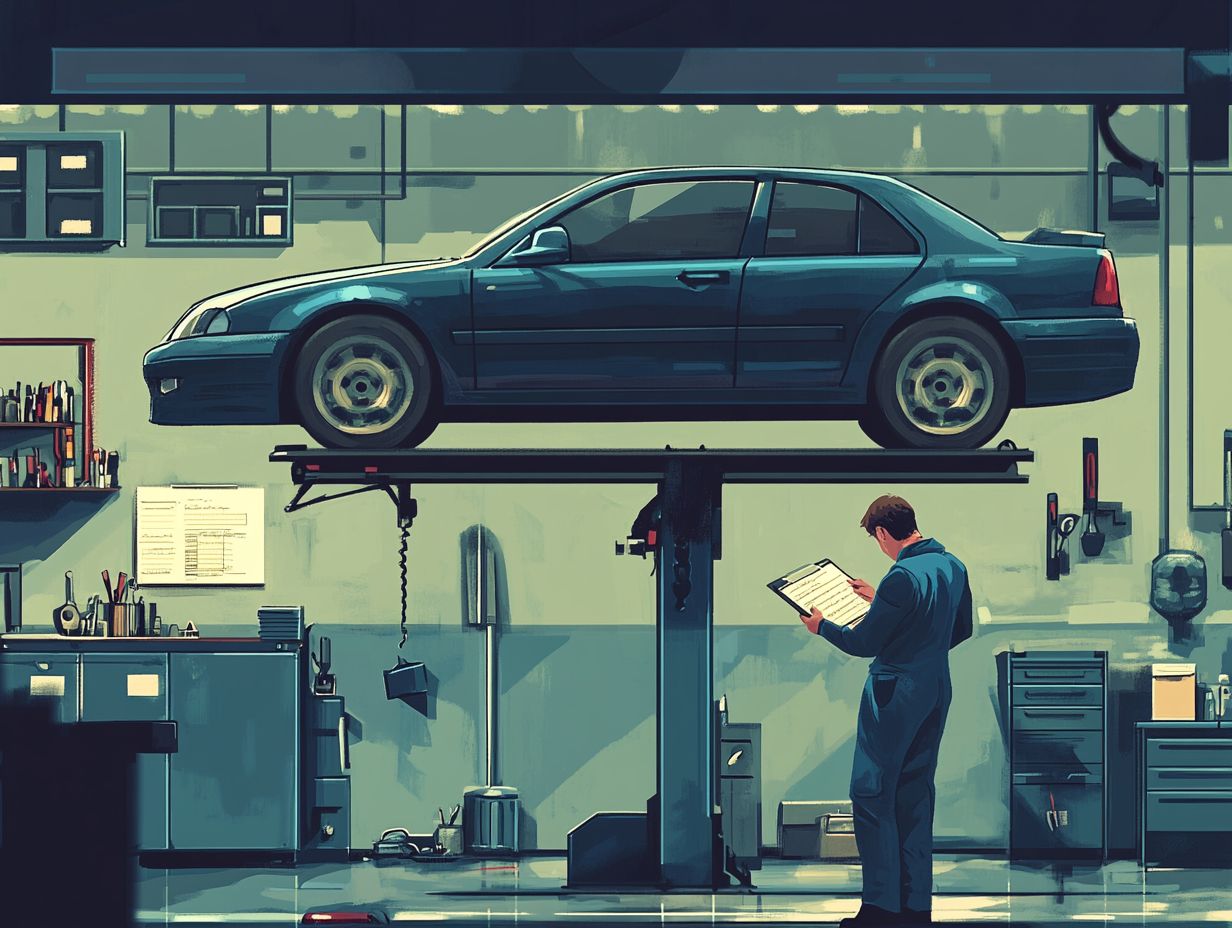
What is a car inspection and why is it necessary?
A car inspection is a thorough check of a vehicle’s condition, including safety, pollutants released by the vehicle, and overall performance. Getting your car inspected keeps you and others safe on the road!
How much does a car inspection typically cost?
The cost of a car inspection can vary based on location, type of inspection, and the age and condition of the vehicle. On average, a standard inspection costs between $50 and $150.
What factors can affect the cost of a car inspection?
Several factors can affect inspection costs, including location, type of inspection, age, and condition of the vehicle. Some states have higher fees, and specialized inspections like emissions or safety checks can also be more expensive. Older or high-mileage vehicles may require more extensive checks, leading to higher costs.
Are there any additional fees or charges to consider when getting a car inspection?
Depending on the location and type of inspection, additional fees may apply. For example, some states may charge a registration fee alongside the inspection fee. If repairs are needed to pass the inspection, factor those costs in as well.
Can I negotiate the cost of a car inspection?
In most cases, the inspection cost is set by the state or facility, leaving little room for negotiation. However, it’s always worth asking about discounts or promotions, especially if you re a regular customer.
Are there any ways to save money on a car inspection?
Yes, there are ways to save money on a car inspection. Some states offer discounts for seniors, military members, or low-income individuals. Shop around and compare prices from different facilities to find the best deal. Keeping your vehicle well-maintained can also help avoid potential issues that could lead to a failed inspection and additional costs.




